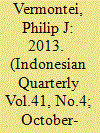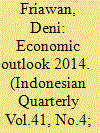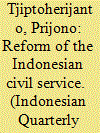|
|
|
Sort Order |
|
|
|
Items / Page
|
|
|
|
|
|
|
| Srl | Item |
| 1 |
ID:
129477


|
|
|
|
|
| Publication |
2013.
|
| Summary/Abstract |
The year 2013 has been seen as a prelude to the so-called political year of 2014. One of the weirdest political scenes in 2013 was when political parties had to advertise in the media in order to find people to
be listed as their candidates for the parliamentary election. Moreover, the parties had to rush in recruiting the candidates to meet deadlines for names submission set out by the Indonesian Election Commission KPU). This can be understood as a symptom of how dysfunctional our political parties are. Party recruitment and training program are indicators of whether or not a political party is well-functioning. A political party has to be ready with its recruitment process immediately after an election is done. It has to start all internal political process right away. By doing so, those who lost in the election will be able to quickly regroup while the winner consolidates. But what we saw in such an advertisement in the media simply reinforces the image
widely held by the public that politicians and /or political parties are just regular job seekers. Politicians are no longer thought of as noble individuals. Politics then become an arena which good people do not intend to enter.
|
|
|
|
|
|
|
|
|
|
|
|
|
|
|
|
| 2 |
ID:
129476


|
|
|
|
|
| Publication |
2013.
|
| Summary/Abstract |
Looking ahead, the outlook in 2014 is expected to see sizeable downside risks, coming from both domestic and external sides. It is estimated that the economic growth in 2014 would remain under 6.0 percent as the country's economy is much more impacted by tighter economic condition, lower commodity prices, as well as uncertainty in financial market and regulatory regime in the run-up to the 2014 election, offsetting the positive effects of global economic recovery and rising spending related national election. Inflation rate, meanwhile, is projected to ease and return to the Bank Indonesia's target band of 4.5:] percent in 2014, as the effect of the effect of the fuel price increases may have subsided and the aggregate demand growth slows.
I however, the recent depreciation in rupiah, the minimum wage hikes for next year, and the second and third-round effects from the increase in fuel prices and electricity billing rates may give further in?ationary pressures to the outlook. As for external side, a modest narrowing in current account deficits is expected to be help by slowing imports, as investment growth continues moderate in 2014.
|
|
|
|
|
|
|
|
|
|
|
|
|
|
|
|
| 3 |
ID:
129475


|
|
|
|
|
| Publication |
2013.
|
| Summary/Abstract |
Community development in the border areas of Indonesia have not received sufficient government attention, despite being a strategic area and a reflection of a country's front line. The focus of this article is the National Community Empowerment Program in the rural border area of West Borneo Previous studies have indicated various impacts to the border area welfare, such as the rise of unemployment within communities, difficulty in gaining access to food sources, increase in the consumptive nature of the people, heightening of criminal cases, decrease of the quality of environment, and the rising presence of patrons and clients. If this issue is left unresolved, the community will surely face increasingly complex conditions.
|
|
|
|
|
|
|
|
|
|
|
|
|
|
|
|
| 4 |
ID:
129478


|
|
|
|
|
| Publication |
2013.
|
| Summary/Abstract |
In the fourth quarter of 2013, there are two cases which might bring implications for both Indonesia as well as ASEAN in the near future. Firstly, the change of government in Australia from the former Labour Party to a Liberal-National coalition has immediately created tension in the bilateral relations of Indonesia and Australia after some period of smooth and constructive relations especially in dealing with the threat of terrorism. The policy of the new administration under Prime Minister Tony Abbott to curb the numbers of boat people coming to Australia has been viewed by Indonesia as challenging its national sovereignty. The second important case is the result of the ASEAN Summit in Brunei Darussalam. The relative success of this
Summit, following a shameful failure of ASEAN to come out with a Joint Communique in Phnom Penh the previous year, has to some ex- tent brought ASEAN back on track towards establishing an ASEAN Community in 2015.
|
|
|
|
|
|
|
|
|
|
|
|
|
|
|
|
| 5 |
ID:
129474


|
|
|
|
|
| Publication |
2013.
|
| Summary/Abstract |
Important aspects toward restoring trust in government among others is the role of leadership in building the credibility of reforms implemented after i988 in Indonesia. Since the Reformation Era which the objectives are improving democratic and local governance, moving governance closer to the people, and strengthening transparency and accountability of the government, the role of bureaucracy; with respect to civil services; is very important in developing, a modern and efficient government system. This article analysis how local government institutions should consist of high competent bureaucracy in order to provide better public services and develop its local government capacity.
|
|
|
|
|
|
|
|
|
|
|
|
|
|
|
|
| 6 |
ID:
129473


|
|
|
|
|
| Publication |
2013.
|
| Summary/Abstract |
This paper examines the United States' pivot strategy in Asia in light of recent developments in the Middle East. More specifically, it discusses the growing perceptions in East Asia about pivoting back" to the Middle East, less than two years after it declared that it would "pivot" to East Asia, The paper dl:~O looks at the strategic implications of regional concerns about America's declining commitment to Fast Asia for the interactional politics of East Asia. It a rogues that while recent events in the Middle East, and America's response, might have heightened East Asia's concerns about America's staying "rug power and the sustainability y of "pivot to ,-'Asia," it is still too early to assume that the "pivot back" to the Middle East would mean that Washington might once again "ignore" East Asia.
|
|
|
|
|
|
|
|
|
|
|
|
|
|
|
|
|
|
|
|
|